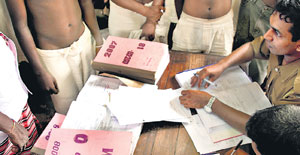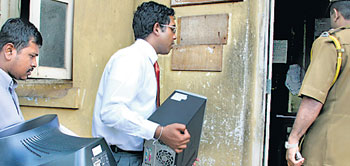
Breaking freePrisoners’ records will be available at the touch of a button, as Welikada gets computerised Stacks and stacks of thick books locked up in a room while in a bustling office uniformed personnel, laboriously filling in details in more ledger-like books, surrounded by men. They come in queues everyday, 50-60 at least, to Welikada, the largest prison in Sri Lanka, after being handed down sentences from all Colombo Magistrate's and District Courts and the Gangodawila and Homagama courts. During the weekends, all first offenders who have to serve long prison terms are also sent here from across the country.
As soon as they disembark from the Black Maria, along with the legal warrants signed by a judge giving not only the nature of the punishment but also the specific period for which they are to be incarcerated, a jailor receives them. The papers are cross-checked and then, begins not only the important but also the tedious task of filling in the Registration Book, with the details of every prisoner. Winds of change, however, are currently sweeping through Welikada and The Sunday Times was there when modern technology in the form of the first batch of computers was carried in to ease this time-consuming work but more crucially to ensure that no prisoner falls through the system. Detailing the entry procedure, all done manually currently, Superintendent Kenneth Fernando said the moment a prisoner's name is entered into the Registration Book he automatically gets the next folio number. The documentation rooms of the Welikada Prison with a staff of about 12, write in everything possible about him.….the full name, the aliases, the address, the level of education, whether married, whether having children, the list goes on along with all physically distinguishing marks such as birthmarks, tattoos, cuts, scars etc. Thereafter, a docket is opened for each new inmate, with a copy of the registration form being inserted. Simultaneously, the prison staff works out the "date of discharge" of the prisoner according to the remission system. Every convict is expected to serve only two-third of his sentence, with one-third being reduced as remission under a specified marking system. It is only after all this paper-work is done that the prisoner is sent for an orientation class by the welfare officer and produced before the Superintendent to be marked for the "trade party" he should join according to his skills and expertise. Court appearances for other offences, home leave, parole, escapes, attempted jail-breaks, hospitalization and also death are documented. On any given day, there are about 4,500 prisoners at Welikada, with an average of 50-60 admissions daily, says SP Fernando. To anyone outside the prison, the documentation process seems a nightmare. Will there be a miss? Will someone fall through the system? Has everyone been accounted for among this mass of humanity and reams of paper - Jamis who spent 50 years at the Angoda Mental Hospital after being sent from the Kurunegala courts way back in the 1950s coming to mind immediately?
Sri Lankan prisons have maintained paper-based records and information related to inmates are prepared and managed manually in spite of known limitations in accuracy and time-lines, The Sunday Times understands. The installation of the computers is part of a 'prisons database project' (see box) which envisages the use of information and communication technology not only at Welikada but also the adjoining Prisons Headquarters under the far-reaching ‘Equal Access to Justice’ Project. Acknowledging that though the world is in the 21st century, the prisons were still in the 19th century, Commissioner-General of Prisons Major-General Vajira Wijeyagoonawardena said the computers will change all that. "We are hoping to replicate this system in all the prisons." Through computerization, all information about the prisoners will be readily available, he said. There have been instances of persons remaining in prison because "the reason for admission", "due date of release" and other such vital information is not readily available, said UNDP's Assistant Resident Representative (Programme) Zoe Keeler while it is learnt that there have been many instances where relatives are unable to locate the inmates, since many are known only by their pet names. Adds Dr. N.W.N. Jayasiri, the UNDP Consultant who is handling the 'Inmate Information System' in plain-speak the database on all prisoners: "A visit to Welikada shows how much paperwork there is and how the clerks have to go through many books to access some simple information." Once the database project was finalized, tenders had been called and in keeping with procedure, one company chosen that being Informatics (Pvt) Ltd. Informatics has the task of installing 16 computers and two servers at the prisons, training the clerks and completing the data entry of all the existing files, amounting to around 4,500, at Welikada, so that the prison staff can continue thereafter. Armed with prior experience of more complicated projects such as the computerization of the Immigration and Emigration Department and also the Registration of Motor Vehicles Department, Informatics' Divisional Manager for Sales and Marketing Bandula Dissanayake says this is a relatively low-cost smaller one though of much national importance. "There will be a network within the prison inclusive of hardware, standard software and application software specific to inmate details while the database will have both text and images," says Mr. Dissanayake, adding that there will be back-up in a secure off-the-site location. Assuring zero errors after installation, he stresses that there is a three-year warranty on the software and hardware. They will also give operational support for two years, while Dr. Jayasiri adds that a security system will be in place when accessing and using data to ensure privacy of inmates. However, paper records will also be maintained, The Sunday Times learns. As the nine months draw to a close in September when the database project will come into operation, the prison staff is also awaiting a new window where at the touch of a button, they will be able to produce instant information on prisoners whereas earlier they had to wade through reams of paper. How did it all start The suggestion to introduce a prisons database came during discussions on how to implement the Equal Access to Justice Project, explained Constitutional Affairs and National Integration Ministry Secretary M.S. Wickramasinghe. The Equal Access to Justice Project, being nationally executed by this ministry with funding from the UNDP, the Netherlands and the Swedish International Development Agency was initiated in 2004 to focus on disadvantaged groups. When the project's Working Group, which also had a representative from the prisons, met, there was this suggestion about the database, she said. "There was a lot of work and now it is getting off the ground with a sub-committee being appointed to look into prison reforms, a part of which is the database project," she said, adding that a visit by the Working Group to Welikada in January underlined the need for the database. Added the National Project Coordinator for the Equal Access to Justice Project, Shermila Antony Perera that a situation analysis in 2004 after a brainstorming session with all sectors in this field pointed to the fact that there was no cohesive whole and not much dialogue, only ad hoc work. The Equal Access to Justice Project is meant to overcome this challenge, she added. What is envisaged under the Inmate Information System
|
|
||||||
|| Front
Page | News | Editorial | Columns | Sports | Plus | Financial
Times | International | Mirror | TV
Times | Funday
Times || |
| |
Reproduction of articles permitted when used without any alterations to contents and a link to the source page.
|
© Copyright
2008 | Wijeya
Newspapers Ltd.Colombo. Sri Lanka. All Rights Reserved. |

